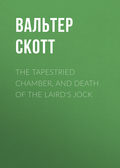
Вальтер Скотт
The Betrothed
He leaned on his esquire's arm, and for an instant laid his head on his shoulder with a depth of emotion which Guarine had never before seen him betray, and which, in awkward kindness, he could only attempt to console, by bidding his master "be of good courage – he had lost but a woman."
"This is no selfish emotion, Philip," said the Constable, resuming self-command. "I grieve less that she has left me, than that she has misjudged me – that she has treated me as the pawnbroker does his wretched creditor, who arrests the pledge as the very moment elapses within which it might have been relieved. Did she then think that I in my turn would have been a creditor so rigid? – that I, who, since I knew her, scarce deemed myself worthy of her when I had wealth and fame, should insist on her sharing my diminished and degraded fortunes? How little she ever knew me, or how selfish must she have supposed my misfortunes to have made me! But be it so – she is gone, and may she be happy. The thought that she disturbed me shall pass from my mind; and I will think she has done that which I myself, as her best friend, must in honour have advised."
So saying, his countenance, to the surprise of his attendants, resumed its usual firm composure.
"I give you joy," said the esquire, in a whisper to the minstrel; "your evil news have wounded less deeply than, doubtless, you believed was possible."
"Alas!" replied the minstrel, "I have others and worse behind." This answer was made in an equivocal tone of voice, corresponding to the peculiarity of his manner, and like that seeming emotion of a deep but very doubtful character.
"Eveline Berenger is then married," said the Constable; "and, let me make a wild guess, – she has not abandoned the family, though she has forsaken the individual – she is still a Lacy? ha? – Dolt that thou art, wilt thou not understand me? She is married to Damian de Lacy – to my nephew?"
The effort with which the Constable gave breath to this supposition formed a strange contrast to the constrained smile to which he compelled his features while he uttered it. With such a smile a man about to drink poison might name a health, as he put the fatal beverage to his lips. "No, my lord – not married," answered the minstrel, with an emphasis on the word, which the Constable knew how to interpret.
"No, no," he replied quickly, "not married, perhaps, but engaged- troth-plighted. Wherefore not? The date of her old alliance was out, why not enter into a new engagement?"
"The Lady Eveline and Sir Damian de Lacy are not affianced that I know of," answered his attendant.
This reply drove De Lacy's patience to extremity.
"Dog! dost thou trifle with me?" he exclaimed: "Vile wire-pincher, thou torturest me! Speak the worst at once, or I will presently make thee minstrel to the household of Satan."
Calm and collected did the minstrel reply, – "The Lady Eveline and Sir Damian are neither married nor affianced, my lord. They have loved and lived together —par amours."
"Dog, and son of a dog," said De Lacy, "thou liest!" And, seizing the minstrel by the breast, the exasperated baron shook him with his whole strength. But great as that strength was, it was unable to stagger Vidal, a practised wrestler, in the firm posture which he had assumed, any more than his master's wrath could disturb the composure of the minstrel's bearing.
"Confess thou hast lied," said the Constable, releasing him, after having effected by his violence no greater degree of agitation than the exertion of human force produces upon the Rocking Stones of the Druids, which may be shaken, indeed, but not displaced.
"Were a lie to buy my own life, yea, the lives of all my tribe," said the minstrel, "I would not tell one. But truth itself is ever termed falsehood when it counteracts the train of our passions."
"Hear him, Philip Guarine, hear him!" exclaimed the Constable, turning hastily to his squire: "He tells me of my disgrace – of the dishonour of my house – of the depravity of those whom I have loved the best in the world – he tells me of it with a calm look, an eye composed, an unfaltering tongue. – Is this – can it be natural? Is De Lacy sunk so low, that his dishonour shall be told by a common strolling minstrel, as calmly as if it were a theme for a vain ballad? Perhaps thou wilt make it one, ha!" as he concluded, darting a furious glance at the minstrel.
"Perhaps I might, my lord," replied the minstrel, "were it not that I must record therein the disgrace of Renault Vidal, who served a lord without either patience to bear insults and wrongs, or spirit to revenge them on the authors of his shame."
"Thou art right, thou art right, good fellow," said the Constable, hastily; "it is vengeance now alone which is left us – And yet upon whom?"
As he spoke he walked shortly and hastily to and fro; and, becoming suddenly silent, stood still and wrung his hands with deep emotion.
"I told thee," said the minstrel to Guarine, "that my muse would find a tender part at last. Dost thou remember the bull-fight we saw in Spain? A thousand little darts perplexed and annoyed the noble animal, ere he received the last deadly thrust from the lance of the Moorish Cavalier."
"Man, or fiend, be which thou wilt," replied Guarine, "that can thus drink in with pleasure, and contemplate at your ease, the misery of another, I bid thee beware of me! Utter thy cold-blooded taunts in some other ear; for if my tongue be blunt, I wear a sword that is sharp enough."
"Thou hast seen me amongst swords," answered the minstrel, "and knowest how little terror they have for such as I am." Yet as he spoke he drew off from the esquire. He had, in fact, only addressed him in that sort of fulness of heart, which would have vented itself in soliloquy if alone, and now poured itself out on the nearest auditor, without the speaker being entirely conscious of the sentiments which his speech excited.
Few minutes had elapsed before the Constable of Chester had regained the calm external semblance with which, until this last dreadful wound, he had borne all the inflictions of fortune. He turned towards his followers, and addressed the minstrel with his usual calmness, "Thou art right, good fellow," he said, "in what thou saidst to me but now, and I forgive thee the taunt which accompanied thy good counsel. Speak out, in God's name! and speak to one prepared to endure the evil which God hath sent him. Certes, a good knight is best known in battle, and a Christian in the time of trouble and adversity."
The tone in which the Constable spoke, seemed to produce a corresponding effect upon the deportment of his followers. The minstrel dropped at once the cynical and audacious tone in which he had hitherto seemed to tamper with the passions of his master; and in language simple and respectful, and which even approached to sympathy, informed him of the evil news which he had collected during his absence. It was indeed disastrous.
The refusal of the Lady Eveline Berengor to admit Monthermer and his forces into her castle, had of course given circulation and credence to all the calumnies which had been circulated to her prejudice, and that of Damian de Lacy; and there were many who, for various causes, were interested in spreading and supporting these slanders. A large force had been sent into the country to subdue the insurgent peasants; and the knights and nobles despatched for that purpose, failed not to avenge to the utter- most, upon the wretched plebeians, the noble blood which they had spilled during their temporary triumph.
The followers of the unfortunate Wenlock were infected with the same persuasion. Blamed by many for a hasty and cowardly surrender of a post which might have been defended, they endeavoured to vindicate themselves by alleging the hostile demonstrations of De Lacy's cavalry as the sole cause of their premature submission.
These rumours, supported by such interested testimony, spread wide and far through the land; and, joined to the undeniable fact that Damian had sought refuge in the strong castle of Garde Doloureuse, which was now defending itself against the royal arms, animated the numerous enemies of the house of De Lacy, and drove its vassals and friends almost to despair, as men reduced either to disown their feudal allegiance, or renounce that still more sacred fealty which they owed to their sovereign.
At this crisis they received intelligence that the wise and active monarch by whom the sceptre of England was then swayed, was moving towards that part of England, at the head of a large body of soldiers, for the purpose at once of pressing the siege of the Garde Doloureuse, and completing the suppression of the insurrection of the peasantry, which Guy Monthermer had nearly accomplished.
In this emergency, and when the friends and dependents of the House of Lacy scarcely knew which hand to turn to, Randal, the Constable's kinsman, and, after Damian, his heir, suddenly appeared amongst them, with a royal commission to raise and command such followers of the family as might not desire to be involved in the supposed treason of the Constable's delegate. In troublesome times, men's vices are forgotten, provided they display activity, courage, and prudence, the virtues then most required; and the appearance of Randal, who was by no means deficient in any of these attributes, was received as a good omen by the followers of his cousin. They quickly gathered around him, surrendered to the royal mandate such strongholds as they possessed, and, to vindicate themselves from any participation in the alleged crimes of Damian, they distinguished themselves, under Randal's command, against such scattered bodies of peasantry as still kept the field, or lurked in the mountains and passes; and conducted themselves with such severity after success, as made the troops even of Monthermer appear gentle and clement in comparison with those of De Lacy. Finally, with the banner of his ancient house displayed, and five hundred good men assembled under it, Randal appeared before the Garde Poloureuse, and joined Henry's camp there.
The castle was already hardly pressed, and the few defenders, disabled by wounds, watching, and privation, had now the additional discouragement to see displayed against their walls the only banner in England under which they had hoped forces might be mustered for their aid.
The high-spirited entreaties of Eveline, unbent by adversity and want, gradually lost effect on the defenders of the castle; and proposals for surrender were urged and discussed by a tumultuary council, into which not only the inferior officers, but many of the common men, had thrust themselves, as in a period of such general distress as unlooses all the bonds of discipline, and leaves each man at liberty to speak and act for himself. To their surprise, in the midst of their discussions, Damian de Lacy, arisen from the sick-bed to which he had been so long confined, appeared among them, pale and feeble, his cheek tinged with the ghastly look which is left by long illness – he leaned on his page Amelot. "Gentlemen," he said, "and soldiers – yet why should I call you either? – Gentlemen are ever ready to die in behalf of a lady – soldiers hold life in scorn compared to their honour."
"Out upon him! out upon him!" exclaimed some of the soldiers, interrupting him; "he would have us, who are innocent, die the death of traitors, and be hanged in our armour over the walls, rather than part with his leman."
"Peace, irreverent slave!" said Damian, in a voice like thunder, "or my last blow shall be a mean one, aimed against such a caitiff as thou art. – And you," he continued, addressing the rest, – "you, who are shrinking from the toils of your profession, because if you persist in a course of honour, death may close them a few years sooner than it needs must – you, who are scared like children at the sight of a death's-head, do not suppose that Damian de Lacy would desire to shelter himself at the expense of those lives which you hold so dear. Make your bargain with King Henry. Deliver me up to his justice, or his severity; or, if you like it better, strike my head from my body, and hurl it, as a peace- offering, from the walls of the castle. To God, in his good time, will I trust for the clearance of mine honour. In a word, surrender me, dead or alive, or open the gates and permit me to surrender myself. Only, as ye are men, since I may not say better of ye, care at least for the safety of your mistress, and make such terms as may secure HER safety, and save yourselves from the dishonour of being held cowardly and perjured caitiffs in your graves."
"Methinks the youth speaks well and reasonably," said William Flammock. "Let us e'en make a grace of surrendering his body up to the King, and assure thereby such terms as we can for ourselves and the lady, ere the last morsel of our provision is consumed."
"I would hardly have proposed this measure," said, or rather mumbled, Father Aldrovand, who had recently lost four of his front teeth by a stone from a sling, – "yet, being so generously offered by the party principally concerned, I hold with the learned scholiast, Volenti non fit injuria."
"Priest and Fleming," said the old banner-man, Ralph Genvil, "I see how the wind stirreth you; but you deceive yourselves if you think to make our young master, Sir Damian, a scape-goat for your light lady. – Nay, never frown nor fume, Sir Damian; if you know not your safest course, we know it for you. – Followers of De Lacy, throw yourselves on your horses, and two men on one, if it be necessary – we will take this stubborn boy in the midst of us, and the dainty squire Amelot shall be prisoner too, if he trouble us with his peevish opposition. Then, let us make a fair sally upon the siegers. Those who can cut their way through will shift well enough; those who fall, will be provided for."
A shout from the troopers of Lacy's band approved this proposal. Whilst the followers of Berenger expostulated in loud and angry tone, Eveline, summoned by the tumult, in vain endeavoured to appease it; and the anger and entreaties of Damian were equally lost on his followers. To each and either the answer was the same.
"Have you no care of it – Because you love par amours, is it reasonable you should throw away your life and ours?" So exclaimed Genvil to De Lacy; and in softer language, but with equal obstinacy, the followers of Raymond Berenger refused on the present occasion to listen, to the commands or prayers of his daughter.
Wilkin Flammock had retreated from the tumult, when he saw the turn which matters had taken. He left the castle by a sally-port, of which he had been intrusted with the key, and proceeded without observation or opposition to the royal camp, where he requested access to the Sovereign. This was easily obtained, and Wilkin speedily found himself in the presence of King Henry. The monarch was in his royal pavilion, attended by two of his sons, Richard and John, who afterwards swayed the sceptre of England with very different auspices.
"How now? – What art thou?" was the royal question.
"An honest man, from the castle of the Garde Doloureuse."
"Thou may'st be honest," replied the Sovereign, "but thou comest from a nest of traitors."
"Such as they are, my lord, it is my purpose to put them at your royal disposal; for they have no longer the wisdom to guide themselves, and lack alike prudence to hold out, and grace to submit. But I would first know of your grace to what terms you will admit the defenders of yonder garrison?"
"To such as kings give to traitors," said Henry, sternly – "sharp knives and tough cords."
"Nay, my gracious lord, you must be kinder than that amounts to, if the castle is to be rendered by my means; else will your cords and knives have only my poor body to work upon, and you will be as far as ever from the inside of the Garde Doloureuse."
The King looked at him fixedly. "Thou knowest," he said, "the law of arms. Here, provost-marshal, stands a traitor, and yonder stands a tree."
"And here is a throat," said the stout-hearted Fleming, unbuttoning the collar of his doublet.
"By mine honour," said Prince Richard, "a sturdy and faithful yeoman! It were better send such fellows their dinners, and then buffet it out with them for the castle, than to starve them as the beggarly Frenchmen famish their hounds."
"Peace, Richard," said his father; "thy wit is over green, and thy blood over hot, to make thee my counsellor here. – And you, knave, speak you some reasonable terms, and we will not be over strict with thee."
"First, then," said the Fleming, "I stipulate full and free pardon for life, limb, body, and goods, to me, Wilkin Flammock, and my daughter Rose."
"A true Fleming," said Prince John; "he takes care of himself in the first instance."
"His request," said the King, "is reasonable. What next?"
"Safety in life, honour, and land, for the demoiselle Eveline Berenger."
"How, sir knave!" said the King, angrily, "is it for such as thou to dictate to our judgment or clemency in the case of a noble Norman Lady? Confine thy mediation to such as thyself; or rather render us this castle without farther delay; and be assured thy doing so will be of more service to the traitors within, than weeks more of resistance, which must and shall be bootless."
The Fleming stood silent, unwilling to surrender without some specific terms, yet half convinced, from the situation in which he had left the garrison of the Garde Doloureuse, that his admitting the King's forces would be, perhaps, the best he could do for Lady Eveline.
"I like thy fidelity, fellow," said the King, whose acute eye perceived the struggle in the Fleming's bosom; "but carry not thy stubbornness too far. Have we not said we will be gracious to yonder offenders, as far as our royal duty will permit?"
"And, royal father," said Prince John, interposing, "I pray you let me have the grace to take first possession, of the Garde Doloureuse, and the wardship or forfeiture of the offending lady."
"I pray you also, my royal father, to grant John's boon," said his brother Richard, in a tone of mockery. "Consider, royal father, it is the first desire he hath shown to approach the barriers of the castle, though we have attacked them forty times at least. Marry, crossbow and mangonel were busy on the former occasions, and it is like they will be silent now."
"Peace, Richard," said the King; "your words, aimed at thy brother's honour, pierce my heart. – John, thou hast thy boon as concerns the castle; for the unhappy young lady, we will take her in our own charge. – Fleming, how many men wilt thou undertake to admit?"
Ere Flammock could answer, a squire approached Prince Richard, and whispered in his ear, yet so as to be heard by all present, "We have discovered that some internal disturbance, or other cause unknown, has withdrawn many of the warders from the castle walls, and that a sudden attack might – "
"Dost thou hear that, John?" exclaimed Richard. "Ladders, man – get ladders, and to the wall. How I should delight to see thee on the highest round – thy knees shaking – thy hands grasping convulsively, like those of one in an ague fit – all air around thee, save a baton or two of wood – the moat below – half-a-dozen pikes at thy throat – "
"Peace, Richard, for shame, if not for charity!" said his father, in a tone of anger, mingled with grief. "And thou, John, get ready for the assault."
"As soon as I have put on my armour, father," answered the Prince; and withdrew slowly, with a visage so blank as to promise no speed in his preparations.
His brother laughed as he retired, and said to his squire, "It were no bad jest, Alberick, to carry the place ere John can change his silk doublet for a steel one."
So saying, he hastily withdrew, and his father exclaimed in paternal distress, "Out, alas! as much too hot as his brother is too cold; but it is the manlier fault. – Gloucester," said he to that celebrated earl, "take sufficient strength, and follow Prince Richard to guard and sustain him. If any one can rule him, it must be a knight of thy established fame. Alas, alas! for what sin have I deserved the affliction of these cruel family feuds!"
"Be comforted, my lord," said the chancellor, who was also in attendance.
"Speak not of comfort to a father, whose sons are at discord with each other, and agree only in their disobedience to him!"
Thus spoke Henry the Second, than whom no wiser, or, generally speaking, more fortunate monarch ever sat upon the throne of England; yet whose life is a striking illustration, how family dissensions can tarnish the most brilliant lot to which Heaven permits humanity to aspire; and how little gratified ambition, extended power, and the highest reputation in war and in peace, can do towards curing the wounds of domestic affliction.
The sudden and fiery attack of Richard, who hastened to the escalade at the head of a score of followers, collected at random, had the complete effect of surprise; and having surmounted the walls with their ladders, before the contending parties within were almost aware of the assault, the assailants burst open the gates, and admitted Gloucester, who had hastily followed with a strong body of men-at-arms. The garrison, in their state of surprise, confusion, and disunion, offered but little resistance, and would have been put to the sword, and the place plundered, had not Henry himself entered it, and by his personal exertions and authority, restrained the excesses of the dissolute soldiery.
The King conducted himself, considering the times and the provocation, with laudable moderation. He contented himself with disarming and dismissing the common soldiers, giving them some trifle to carry them out of the country, lest want should lead them to form themselves into bands of robbers. The officers were more severely treated, being for the greater part thrown into dungeons, to abide the course of the law. In particular, imprisonment was the lot of Damian de Lacy, against whom, believing the various charges with which he was loaded, Henry was so highly incensed, that he purposed to make him an example to all false knights and disloyal subjects. To the Lady Eveline Berenger he assigned her own apartment as a prison, in which she was honourably attended by Rose and Alice, but guarded with the utmost strictness. It was generally reported that her demesnes would be declared a forfeiture to the crown, and bestowed, at least in part, upon Randal de Lacy, who had done good service during the siege. Her person, it was thought, was destined to the seclusion of some distant French nunnery, where she might at leisure repent her of her follies and her rashness.
Father Aldrovand was delivered up to the discipline of the convent, long experience having very effectually taught Henry the imprudence of infringing on the privileges of the church; although, when the King first beheld him with a rusty corslet clasped over his frock, he with difficulty repressed the desire to cause him to hanged over the battlements, to preach to the ravens.
With Wilkin Flammock, Henry held much conference, particularly on his subject of manufactures and commerce; on which the sound- headed, though blunt-spoken Fleming, was well qualified to instruct an intelligent monarch. "Thy intentions," he said, "shall not be forgotten, good fellow, though they have been anticipated by the headlong valour of my son Richard, which has cost some poor caitiffs their lives – Richard loves not to sheathe a bloodless weapon. But thou and thy countrymen shall return to thy mills yonder, with a full pardon for past offences, so that you meddle no more with such treasonable matters."
"And our privileges and duties, my liege?" said Flammock. "Your Majesty knows well we are vassals to the lord of this castle, and must follow him in battle."
"It shall no longer be so," said Henry; "I will form a community of Flemings here, and thou, Flammock, shalt be Mayor, that thou may'st not plead feudal obedience for a relapse into treason."
"Treason, my liege!" said Flammock, longing, yet scarce venturing, to 'interpose a word in behalf of Lady Eveline, for whom, despite the constitutional coolness of his temperament, he really felt much interest – "I would that your Grace but justly knew how many threads went to that woof."
"Peace, sirrah! – meddle with your loom," said Henry; "and if we deign to speak to thee concerning the mechanical arts which thou dost profess, take it for no warrant to intrude farther on our privacy."
The Fleming retired, rebuked, and in silence; and the fate of the unhappy prisoners remained in the King's bosom. He himself took up his lodging in the castle of the Garde Doloureuse, as a convenient station for sending abroad parties to suppress and extinguish all the embers of rebellion; and so active was Randal de Lacy on these occasions, that he appeared daily to rise in the King's grace, and was gratified with considerable grants out of the domains of Berenger and Lacy, which the King seemed already to treat as forfeited property. Most men considered this growing favour of Randal as a perilous omen, both far the life of young De Lacy, and for the fate of the unfortunate Eveline.






